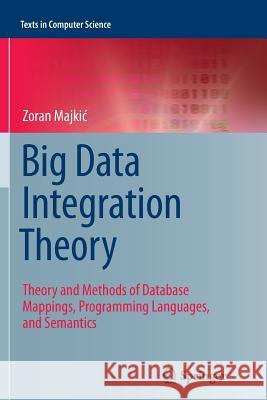Big Data Integration Theory: Theory and Methods of Database Mappings, Programming Languages, and Semantics » książka
Big Data Integration Theory: Theory and Methods of Database Mappings, Programming Languages, and Semantics
ISBN-13: 9783319355399 / Angielski / Miękka / 2016 / 516 str.
Big Data Integration Theory: Theory and Methods of Database Mappings, Programming Languages, and Semantics
ISBN-13: 9783319355399 / Angielski / Miękka / 2016 / 516 str.
(netto: 192,11 VAT: 5%)
Najniższa cena z 30 dni: 192,74
ok. 16-18 dni roboczych.
Darmowa dostawa!
The challenges of big data demand a clear theoretical and algebraic framework, extending the standard relational database (RDB) with more powerful features in order to manage the complex schema mappings.This unique textbook/reference presents a novel approach to database concepts, describing a categorical logic for database schema mapping based on views, within a very general framework for database integration/exchange and peer-to-peer. Issues of database mappings, database programming languages (algebras), and denotational and operational semantics are discussed in depth. An analysis method is also developed that combines techniques from second order logic, data modeling, co-algebras, and functorial categorial semantics.Topics and features: provides a concise, formal introduction to logics, (co-)algebras, databases, schema mappings and category theory; describes the core concepts of big data integration theory, supported by a number of practical examples; examines the computational properties of the DB category, compared to the extensions of Codd's SPRJU relational algebra and structured query language (SQL); defines the abstract computational machine, the categorial RDB machine, able to support all DB computations by SQL embedding; presents full operational semantics for database mappings (programs); discusses matching and merging operators (tensors) for databases, universal algebra considerations, and algebraic lattices of the databases; explores the relationship of the database weak monoidal topos with respect to intuitionistic logic.This self-contained textbook is ideal for graduate courses on database engineering methods, and can also be used as a supplementary text for courses on co-algebras and category theory. Researchers and software engineers interested in databases and logics will also find the book to be a useful reference.











